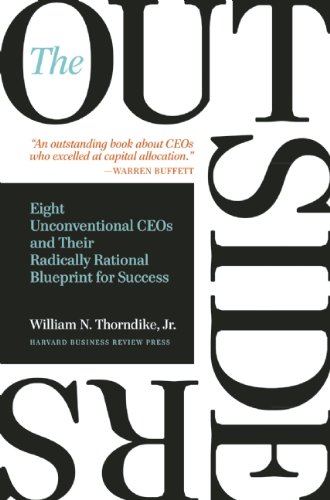

This article is an excerpt from the Shortform summary of "The Outsiders" by William N. Thorndike, Jr. Shortform has the world's best summaries of books you should be reading.
Like this article? Sign up for a free trial here .
What makes a great CEO? Is it their education, experience, or just natural business instincts? What are the most important CEO personality traits?
In The Outsiders, William Thorndike claims that a certain personality may be part of what makes a great CEO. When examining the top CEOs of all time, certain CEO personality traits are clearly shown to benefit management style and company success.
CEO Personality Traits
Eight CEOs and companies outperformed their peers and the larger market during the 20th century. Looking deeper into their management practices, The Outsiders found virtually identical patterns to their management style that were unorthodox but directly caused their outsized results. This CEO personality type is thought to help make successful CEOs.
One of these patterns is the important CEO personality traits. The Outsider CEOs showed patterns to their personalities that informed how they ran their businesses. They departed from common wisdom about how to operate a company and behave as a CEO, and got results. So what are these CEEO personality traits that can make you like a successful Outsider CEO?
1. Independent Thinkers
Outsider CEOs preferred to come to their own conclusions instead of following conventional wisdom. They were analytical and rational about their businesses, indicating a certain CEO personality type. All were quantitative people, with more having engineering degrees than MBAs.
This independent thinking often led to unorthodox practices, such as buying back shares when none of their peers were, or ignoring traditional measures of value like reported earnings and book value. But even when observers were skeptical, outsider CEOs cared little what others thought. This iconoclast personality allowed them to avoid the peer pressure of imitating other CEOs, one of the most important CEO personality traits for making big decisions.
They were also broad thinkers, familiar with a variety of industries and disciplines, which translated into new perspectives and approaches. Using the metaphor of a “hedgehog,” who knows one thing very well, or a “fox,” who knows many things, the outsider CEOs were foxes. For example, Bill Stiritz of Ralston Purina had an unusual blend of marketing acumen and financial astuteness.
2. New to the Job
The CEOs featured in the book were first-time CEOs, with little management experience. Only two had MBAs. In fact, many were new to their industries. Of the CEO personality traits, this one might seem a bit counterintuitive. But this inexperience might have helped their management, as they were unbound by conventional wisdom and built their practices independently, from first principle.
3. Understated
When you think of successful CEO personality traits, you might think about charismatic leaders. But Outsider CEOs were humble and did not seek the spotlight. They avoided magazine covers and public talks. They weren’t considered charismatic. They were not household names in business, and so few people other than sophisticated investors and company fans know about them. They lived seemingly boring lives and were happily married. They were patient and tolerated waiting long periods of time for compelling opportunities to arise.
Again, this did not mean timidness. When outsider CEOs saw a great opportunity, they acted boldly and decisively.
CEO Personality in Decision-Making Processes
Outsider CEOs thought about their companies as investors and made cool, rational decisions based on what provided the best returns. Ego and a desire to build empires were never part of the decision, and were not considered desirable CEO personality traits.
In contrast, think about a more stereotypical CEO personality type, not the one the Outsider CEOs share. Typical CEOs issued shares to fund costly acquisitions, preferred not to buy back stock or raise debt, and paid dividends frequently. In the conglomerate era, they aggressively acquired companies believing they could improve profits through scale or synergies; this was often a mirage that never materialized. All these activities tend to result in lower performance by the author’s favorite metric—price-per-share.
Note that the optimal choices vary from company to company, from industry to industry, and between different time periods. The point is not to blindly mirror what the outsider CEOs did—it’s to examine all of the tools in your toolkit, and choose the best one based on rational analysis.
An Outsider CEO has several core personality traits that help make them successful. These CEO personality traits also inform the CEO’s decision-making processes, especially when it comes to things like capital allocation, and other business making decisions. CEO personality traits are an important part of the CEO’s ability to succeed as an Outsider CEO.

———End of Preview———
Like what you just read? Read the rest of the world's best summary of William N. Thorndike, Jr's "The Outsiders" at Shortform .
Here's what you'll find in our full The Outsiders summary :
- What great CEOs like Warren Buffett do that average CEOs don't
- How to master the art of capital allocation
- How to be a great manager that your team is excited to work with






